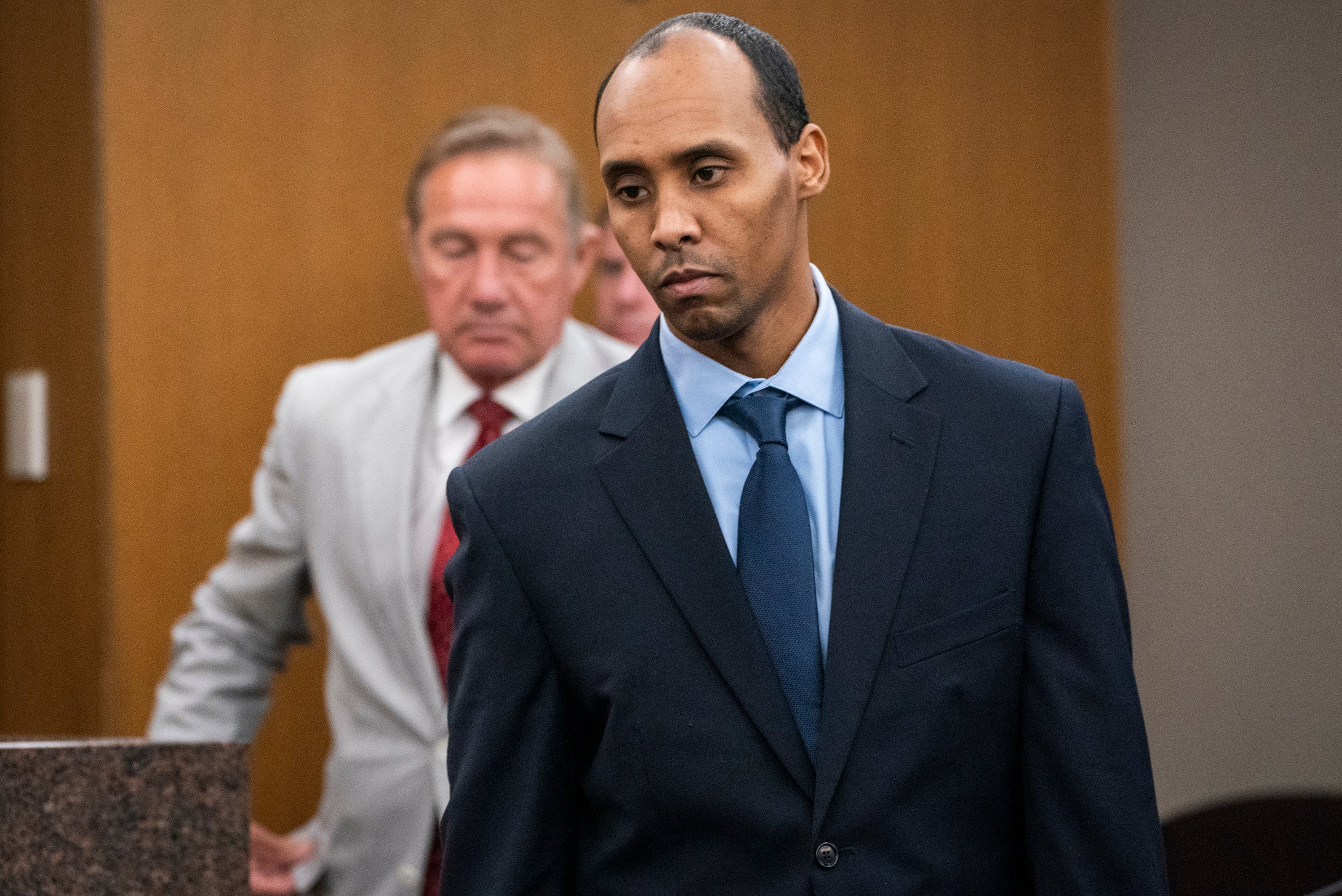Ex-Minneapolis cop to be resentenced in death of 911 caller
A former Minneapolis police officer who fatally shot an unarmed woman after she called 911 to report that she heard a possible rape happening behind her home will be sentenced on a lesser charge

A former Minneapolis police officer who fatally shot an unarmed woman after she called 911 to report hearing a possible rape happening behind her home will be sentenced on a lesser charge Thursday after his murder conviction was overturned in a case that drew global attention and was fraught with the issue of race.
Mohamed Noor was initially convicted of third-degree murder and manslaughter in the July 2017 fatal shooting of Justine Ruszczyk Damond, a 40-year-old dual U.S.-Australian citizen and yoga teacher who was engaged to be married.
Noor testified at his 2019 trial that he and his partner were driving slowly in an alley when a loud bang on his police SUV made him fear for their lives. He said he saw a woman appear at the partner’s window and raise her right arm before he fired a shot from the passenger seat to stop what he thought was a threat.
He was sentenced to 12 1/2 years on the murder count and had been serving most of his time at an out-of-state facility. But last month, the Minnesota Supreme Court tossed out Noor’s murder conviction and sentence, saying the third-degree murder statute didn’t fit the facts of the case.
Noor remains convicted of second-degree manslaughter, which carries a sentence ranging from 41 to 57 months, with a presumptive sentence of four years under the state's sentencing guidelines.
His attorneys, Tom Plunkett and Peter Wold, have asked for a 41-month term, saying the low end of the range would reflect Noor’s good behavior behind bars and the harsh conditions he's faced during several months in segregation from the general prison population. Legal experts expect prosecutors to seek a sentence at the top end of the range.
Noor, who was fired after he was charged, has already served more than 29 months. In Minnesota, defendants with good behavior typically serve two-thirds of their prison sentences and the remainder on supervised release. If Noor receives the presumptive four years for manslaughter, he could be eligible for supervised release around the end of this year.
If the judge agrees with the defense and sentences Noor to 41 months, he could be placed on supervised release very soon.
Marsh Halberg, a Minneapolis defense attorney who is not connected to the case, predicted Judge Kathryn Quaintance would sentence Noor to four years. However, he said: “The right thing to do would be to give him the low end … because he’s been in solitary.”
Noor has the right to make a statement at Thursday’s hearing, though it was not immediately clear if he would. At his June 7, 2019, sentencing, he got emotional as he expressed regret for what he had done and apologized to Damond’s family.
“I caused this tragedy, and it is my burden,” he said at the time, adding: “I can’t apologize enough and I will never be able to make up the loss that I caused to Miss Ruszczyk’s family.”
Victims are expected to make statements. Prosecutors say Damond’s family members, who came from Australia for the 2019 trial, will not appear in person but might appear live via video.
Damond’s death angered citizens in the U.S. and Australia, and led to the resignation of Minneapolis’ police chief. It also led the department to change its policy on body cameras; Noor and his partner didn’t have theirs activated when they were investigating Damond’s 911 call.
Noor, who is Somali American, was believed to be the first Minnesota officer convicted of murder for an on-duty shooting. Activists who had long called for officers to be held accountable for the deadly use of force applauded the murder conviction but lamented that it came in a case in which the officer is Black and his victim was white. Some questioned whether the case was treated the same as police shootings involving Black victims.
Days after Noor’s conviction, Minneapolis agreed to pay $20 million to Damond’s family. It was believed to be the largest settlement stemming from police violence in Minnesota to that point, with Mayor Jacob Frey citing Noor’s unprecedented conviction for the large settlement.
But the state Supreme Court ultimately ruled that the murder conviction didn't fit the evidence, saying third-degree murder can only apply when a defendant shows a “generalized indifference to human life,” not when the conduct is directed at a particular person, as it was with Damond.
The decision devastated Damond’s loved ones. Her fiancé, Don Damond — she had been using his last name even though their wedding was a month away when she was killed — said at the time of the ruling: “None of this can hurt my heart more than it has been, but now it truly feels like there has been no justice for Justine.”
But others said said it was the right decision.
“This should’ve never been allowed to go to trial on that (murder) charge,” said Halberg. “It may feel good to charge something like that because it sounds like you are being more zealous as a prosecutor, but the law doesn’t fit.”
Since Noor’s case, another former Minnesota officer has been convicted of murder. Derek Chauvin was convicted in April of second-degree unintentional murder, third-degree murder and manslaughter in the May 25, 2020, death of George Floyd. Chauvin was sentenced to 22 ½ years on the second-degree murder count. It's likely his third-degree murder conviction will be overturned given the Noor ruling, but the second-degree murder count is expected to stand, legal experts say.
Minneapolis reached a $27 million settlement with Floyd’s family.
Bookmark popover
Removed from bookmarks